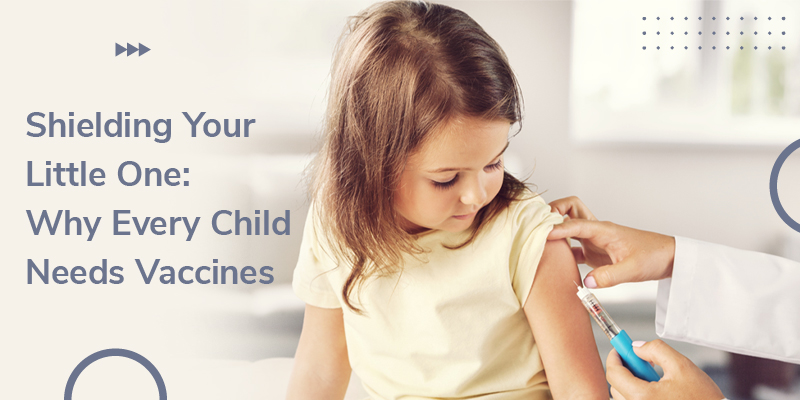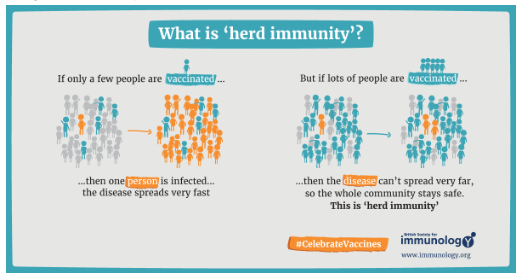
Shielding Your Little One: Why Every Child Needs Vaccines
It is hard to imagine the quality of life today if it weren’t for vaccines. It wouldn’t be an exaggeration to state that vaccines have blessed humanity with the ability to live healthier, longer lives.
Vaccination has come a long way since it was introduced in the 1700s. From then to now, they have played an indomitable role in preventing life-threatening diseases in both children and adults.
What are vaccines?
Vaccines are biologically created products or substances that provide acquired immunity against a particular infection or disease.
Today, vaccination starts right from Day 1 of a child’s life. Childhood vaccination aims to shore up the body’s natural defenses and empower the body to fight diseases before they have a chance to attack the system.
Vaccines are man-made marvels. Although each one is uniquely designed to work in different ways, the ultimate aim is to train your body’s immune system to fight against a host of diseases more quickly and effectively. Vaccines are, in fact, the safest protection option. Vaccinated children should be able to fight off the disease even if they get infected.
Besides, no vaccine works right after it is injected into your system. It takes a few weeks for the effects to manifest. However, the protection may stay for a lifetime once it's done. The smallpox vaccine is one such example.
Not all vaccines are effective for life, though. For example, tetanus and seasonal flu shots require periodical booster doses to remain effective for long.
So, how do vaccines work? A vaccine triggers your immune system's response to specific diseases so that you can fight infections more effectively, regardless of age. The immune system will then know exactly how to fight bacteria and viruses if they ever invade their body in the future. But this is just the tip of the iceberg. Let’s delve into the details.
Infections, Immune System & Vaccines: How Do They Work in Children?
Everyone is born with an immune system. It is our fundamental wall of protection that responds when bacteria or viruses invade and attack our body. Small children and babies often fall sick due to bacterial or viral infections. When such an invasion occurs, the child’s immune system is alerted. It immediately responds by creating “antibodies” to fight off the infection and bring the body back to normal.
The antibodies are proteins designed to hunt down infection-causing foreign organisms and identify them for destruction. Although the term is generic, all antibodies are not the same. They are specific to the bacteria or virus they detect. These antibodies trigger a specific immune response and will remain in your child’s immune system until the infection dies down.
In due course of time, your child’s body builds its own immune system that triggers a response if the bacterial or viral infection is repeated. Your child’s immune system gears into action because it already has a memory of the infection and is well-equipped to destroy it before it can develop any further. Natural immunity works in this way.
Vaccination, on the other hand, stimulates the immune system to produce antibodies just as an infection would. The biggest difference is that the vaccine does not make your child sick.
The vaccines work silently within the system to produce the antibodies while your child is hale, healthy and normal. With the help of the vaccine, your child’s body is protected against that particular infection. This means that even if the specific organism infects your child, they remain unaffected. This is the kind of immunity that vaccines offer.
Immunity & Its Types
There are three ways children can develop immunity against diseases.
1. Active Immunity
An actively immune child means that they have acquired the antibodies for a specific bacteria or virus. For example, if the child’s body has the antibodies for chickenpox, they could have acquired the immunity through natural infection. This is called “natural immunity,” meaning the antibodies developed as a result of the infection will prevent the child from getting chickenpox once again.
Another way of acquiring active immunity is through vaccination. Most vaccines induce immunity by producing antibodies.
2. Passive Immunity
Passive" immunity is obtained from serum immune globulins, where antibodies are sourced from a large pool of donors. Unlike active immunity, passive immunity is short-lived. It provides temporary immunity to children exposed to a specific bacteria or virus.
One of the best examples of passive immunity is HBIG or Hepatitis B Immune Globulin, administered to newborns whose mothers are infected with Hepatitis B. The HBIG vaccine temporarily shields the newborn from getting the infection from the mother.
3. Herd Immunity
Herd immunity happens with the infection cannot spread from person to person because most of them are already immune to it. It is called “herd” immunity because a large portion of the community are resistant to the germ. For example, if 95% of the population is vaccinated for measles, the unvaccinated 5% will be protected because the germ cannot spread.

Now comes the million-dollar question: Why should you vaccinate your child? Let’s understand a basic fact: Babies are born without a fully developed immune system, making them more susceptible to infections. Even the mildest infections can become life-threatening for children and infants without adequate immunity.
As the child grows, they will develop a good immune system based on how their body responds to diseases. Meanwhile, only vaccination can provide them with the protection they need to build their natural defenses.
There’s more to why you should vaccinate your child. The world has made a collective effort to wipe out highly contagious diseases like:
- Smallpox
- Diphtheria
- Polio
- Measles
Incidences of these diseases have almost trickled down to near-zero levels. However, unless these germs are prevented regularly, they can always come back. That is why we need to vaccinate children so they remain immune to these diseases for life.
Moreover, advancements in science have made it possible to create childhood vaccines with 85% -95% effectiveness. These facts reiterate that childhood vaccination can:
- Prevent more than 51 million deaths between the years 2021 and 2030.
- Save nearly 19 million lives from measles by 2030.
- Ave about 14 million lives from Hepatitis B by 2030.
- Completely eradicate some diseases off the face of the earth, like smallpox.
If you are still wary about vaccination for your child, please know that:
- Vaccination is the safest, easiest, and most effective way to keep your child healthy.
- All vaccines are tested to ensure they can be administered safely and effectively at the recommended age. Immunization schedules balance the risk of disease exposure with the most effective time to administer vaccines.
Are vaccines safe, especially for children?
Without doubt, they are. You would rather protect your child with vaccines than expose them to vaccine-preventable diseases, would you not?
Besides, it is crucial to know that vaccines are not made in a day. It takes the effort and research of multiple experts to create a vaccine for a particular disease. It requires months or years of rigorous testing and clinical trials before the vaccine is approved for public use.
On top of it all, governments are extra cautious about distributing vaccines in their healthcare systems. All nations will register and procure vaccines ONLY if they meet the rigorous quality and safety standards.
Also Read: 8 Iron-Rich Foods to Keep You Anemia-Free
Do vaccines have side effects?
Some vaccines may cause temporary effects like:
- Fever
- Fatigue
- Body pain
- Swelling and tenderness on the injected site
These symptoms will most likely disappear within a few days of the shot. But rest assured that long-lasting side effects are extremely rare with vaccines.
Immunization schedules for children
Immunization or vaccination schedules for children vary from country to country. Most schedules are drafted based on the most prevalent diseases in that region. Like earlier mentioned, vaccination begins as early as possible to provide each child with the utmost protection. It is the best approach to protect the child against common childhood illnesses and diseases that can develop later in life.
Vaccines prevent many diseases that are more serious in young children. Moreover, the odds of receiving all the recommended vaccines are higher for infants and children frequently seen by their healthcare provider during their first year of life.
REAN HealthGuru App: Track Your Child’s Immunization Schedule
The REAN HealthGuru app is a digital blessing that you can use to track your child’s vaccine dosage. Here’s how REAN HealthGuru works:
- Create a patient/child profile.
- Update details about the ailment
- Update the medication and recommended dosage
- Set the reminder
It's as easy as that! Our AI-driven, scientifically proven app will notify you about upcoming vaccination appointments. Invest in REAN HealthGuru and retain your peace of mind!



